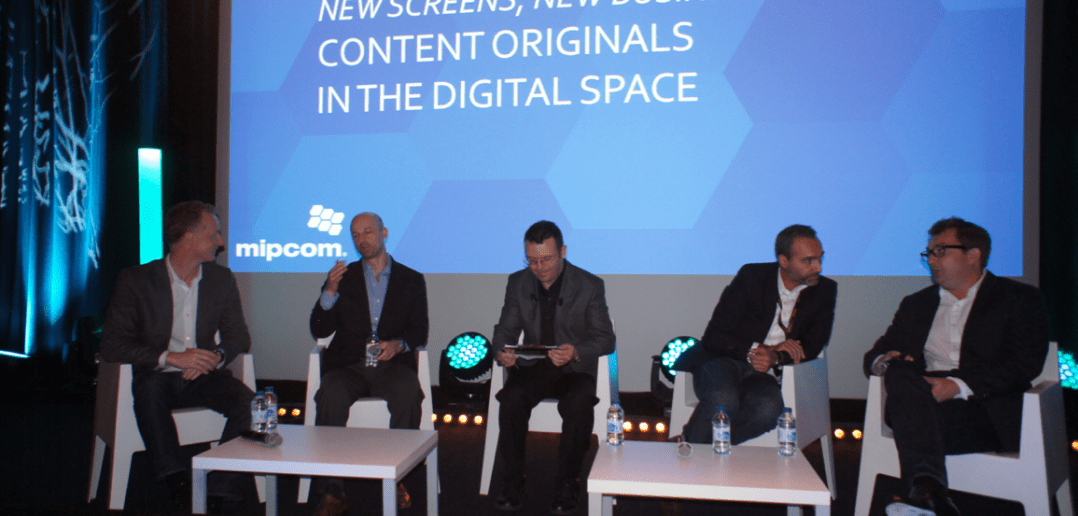Full conference videos on MIPCOM.com
Left to right: Ben McOwen-Wilson, Director, Content, Partnerships NACE, YouTube UK; Larry Tanz, CEO, Vuguru USA; Moderator Gary Woolf, VP Business Development & Digital, Sales & Distribution, BBC Worldwide UK; Jean-François Rodriguez, Head of Gaming & Transmedia, Orange France; Matthew Forde, EVP-Sales & Co-Productions, BBC Worldwide Americas.
BBC Worldwide’s Gary Woolf moderated this session on producing content for digital. Orange’s gaming and transmedia head, Jean-François Rodriguez, kicked off with a trailer for Alt-Minds, a transmedia game/series coproduced by Lexis Numérique and written by Eric Viennot.
What’s special about Alt-Minds is that users are “engaged after the programme and during the programme. This is the first thing,” according to Rodriguez. The second thing is that, thanks to platforms like Wii and smartphones, “everybody plays” — including women, who comprise 52% of France’s gamers.
Alt-Minds makes it possible for users to engage however they see fit — and if you don’t want to at all, you can just sit back and watch the web series. “If you want to be more engaged,” said Rodriguez, you can play. “And if you’re a hardcore gamer, you’ll also have a [more complicated]level of game: you’ll need to move in real life in order to find new missions.”
The real-time game launches in November. In it, users must follow a set of clues to find five physicists who’ve mysteriously disappeared. It’ll span video, Facebook and the real world.
Next, Larry Tanz of Vuguru talked about what his studio’s been up to. The native multi-screen production studio last experimented with the same piece of content in multiple lengths: 2 minutes, 10 minutes, 22 and 30 minutes, the better to avail a story across every platform imaginable while facilitating the rights problem for partners. Often with Vuguru, shorter-form content gets sub-licensed to DailyMotion, while mid-length content goes to channels.
“What [certain networks]put on the channel they can’t also put online because it conflicts with some of their MSO relationships,” explained Tanz. “We try to put all rights on the table,” but it varies. “It’s a new world.”
BBC Worldwide’s Matthew Forde pointed out that there’s so much you can do with a single piece of creative now. “You can move from short-form to long-form, or you can go from digital to a cable sale, and we did that with Misfits.” But “the differentiator is price and how much people want things exclusively.” There will simply be days exclusivity rules, as Tanz pointed out.
To manage this balance, Forde emphasised “[listening]to what the needs of your tradition cable customers are, and the needs of digital platforms.” It is really about understanding the creative ambitions of everyone involved.
“What we’re looking for is people who have deep passion for particular areas” in content creation, said McOwen-Wilson, referring to partners like Vuguru or BBC Worldwide. “We’re looking for partners who are really passionate about a particular area where they can find an audience on YouTube that they can grow over time.”
Fashion and beauty on YouTube, for example, represent what McOwen-Wilson called an “enormous” market. He cited the UK’s Pixiwoo and US-based StyleHaul is prime examples of cottage businesses that have grown into slick content conglomerates constructed on YouTube’s back. They’ve “all built enormous channels … and that’s absolutely what we’re looking to do,” he stressed, saying YouTube provides support for launch and building audiences over time.
Tanz spoke to the frustrations of being talent in this industry. “If you’re a talented filmmaker with a great idea, getting finance is very challenging. We’re able to work with that talent because we write a check.” It’s great when that content goes somewhere like AOL, he added, but even if not, “we’ll do it anyway.”
YouTube, too, in the business of “creating big-name talent,” McOwen-Wilson pitched in. “Think of PSY, Gangnam Style … for people who never heard of K-Pop”. YouTube “can help you find an audience way beyond your traditional audience.”
“For us it’s about giving the talent significant opportunity in creative involvement and helping them take risks,” said Tanz. “You can try new things. That’s appealing for the talent, and I also think we’re still in the time when digital’s exciting, like in the early days of cable.”
The early days of cable were really terrible, he added; “digital’s a little bit different.” On youtube, 10 million people might watch your content, and “That’s really exciting.”
“There are definitely lots of talent out there who just don’t do digital yet,” Forde reflected. The sooner such people see the power of digital and experience the rewards of getting it right, “we’ll see it changing more quickly.”




